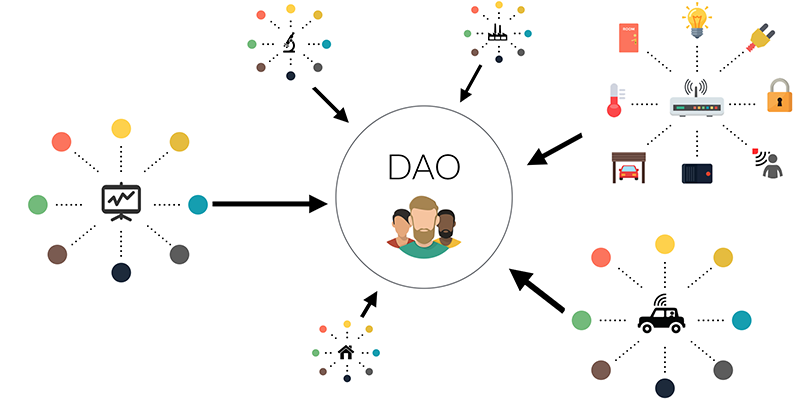Imagine a new internet that puts power back into the hands of individuals, where transparency and fairness reign supreme. That’s Web3, the next generation of the internet. And at the heart of this transformative movement are DAOs (decentralized autonomous organizations). These remarkable entities are here to revolutionize how we govern and make decisions in the digital world.
Understanding DAOs
DAOs are like self-operating organizations that run on blockchain technology. They also operate through smart contracts, which are like digital agreements that automatically execute rules and actions. They allow us to collectively manage resources and make decisions without relying on traditional centralized structures.

How do the DAOs work?
DAOs, or decentralized autonomous organizations, use smart contracts and blockchain technology to empower individuals and also revolutionize decision-making in the digital landscape. Let’s dive deeper into how DAOs work and how they empower individuals.
-
Smart Contracts: At the Core of DAOs
Smart contracts serve as the backbone of DAOs. They autonomously execute transactions and enforce rules, also eliminating the need for intermediaries. DAOs rely on blockchain technology to ensure transparency and fairness.
-
Tokenized Governance: Ownership and Influence
DAOs also often utilize tokens to represent ownership or voting rights. Tokens give individuals the power to influence decisions and shape the organization’s direction. The more tokens one holds, the greater their influence in the decision-making process.
-
Proposals and Voting: Active Participation
DAOs thrive on active participation from members. Anyone can submit proposals to the DAO, suggesting new initiatives, changes, or resource allocations. Token holders can cast votes to approve or reject proposals. This democratic process ensures collective decision-making.
-
Resource Allocation: Funding Projects and Initiatives
DAOs also enable decentralized funding and resource allocation. Once a proposal is approved, the DAO’s treasury allocates funds or raises funds through token sales. This also empowers the community to support projects they believe in, bypassing traditional funding models.
-
Evolution through Iteration: Flexibility and Adaptability
DAOs are not static entities. They can also evolve and adapt over time. Smart contracts can also be upgraded to introduce new functionalities or address emerging challenges. DAOs employ governance processes to determine and execute these upgrades, ensuring their relevance and effectiveness.
-
Governance Models: Decentralized Decision-Making
DAOs employ different governance models. Some follow a direct democracy approach, where every token holder has equal voting power. Others utilize delegation mechanisms, also allowing token holders to delegate voting power to trusted individuals or experts. These models ensure decisions reflect the collective will and expertise of the DAO’s participants.

Use Cases of DAOs in Web3
DAOs have found applications in various areas within the Web3 ecosystem, including:
Decentralized Finance (DeFi)
DAOs are the driving force behind the explosive growth of DeFi. They enable the governance and management of decentralized lending platforms, exchanges, and yield farming protocols, providing financial services without intermediaries.
Decentralized Governance
DAOs are transforming governance itself. They are also employed to govern blockchain networks, decentralized applications (dApps), and entire ecosystems. DAOs allow stakeholders to participate in decision-making processes, collectively shaping the rules and protocols that govern their communities.
Content Creation and Curation
DAOs are also being used to incentivize content creators and curators. Content platforms built on DAO principles reward creators for their contributions, promoting fairness and quality content while fostering vibrant communities.
Decentralized Autonomous Collectives
DAOs also enable the formation of decentralized autonomous collectives, where individuals from around the world collaborate on common goals. These collectives also leverage the transparency and automation of DAOs to organize and coordinate their efforts effectively.

Challenges and Future Outlook
While DAOs hold immense potential, they also face challenges. Scalability of blockchain networks, governance scalability, and the establishment of legal frameworks are areas that require further development and refinement. Additionally, ensuring inclusivity and preventing the concentration of power within DAOs also remain as important considerations.
DAOs reshape organizational structures in the digital world. Through smart contracts and blockchain technology, they also empower individuals and enable decentralized decision-making. As DAOs continue to evolve, they have the potential to transform traditional models and also empower communities to shape their digital future.
Click here to learn more about Web 3.

Your article helped me a lot, is there any more related content? Thanks!